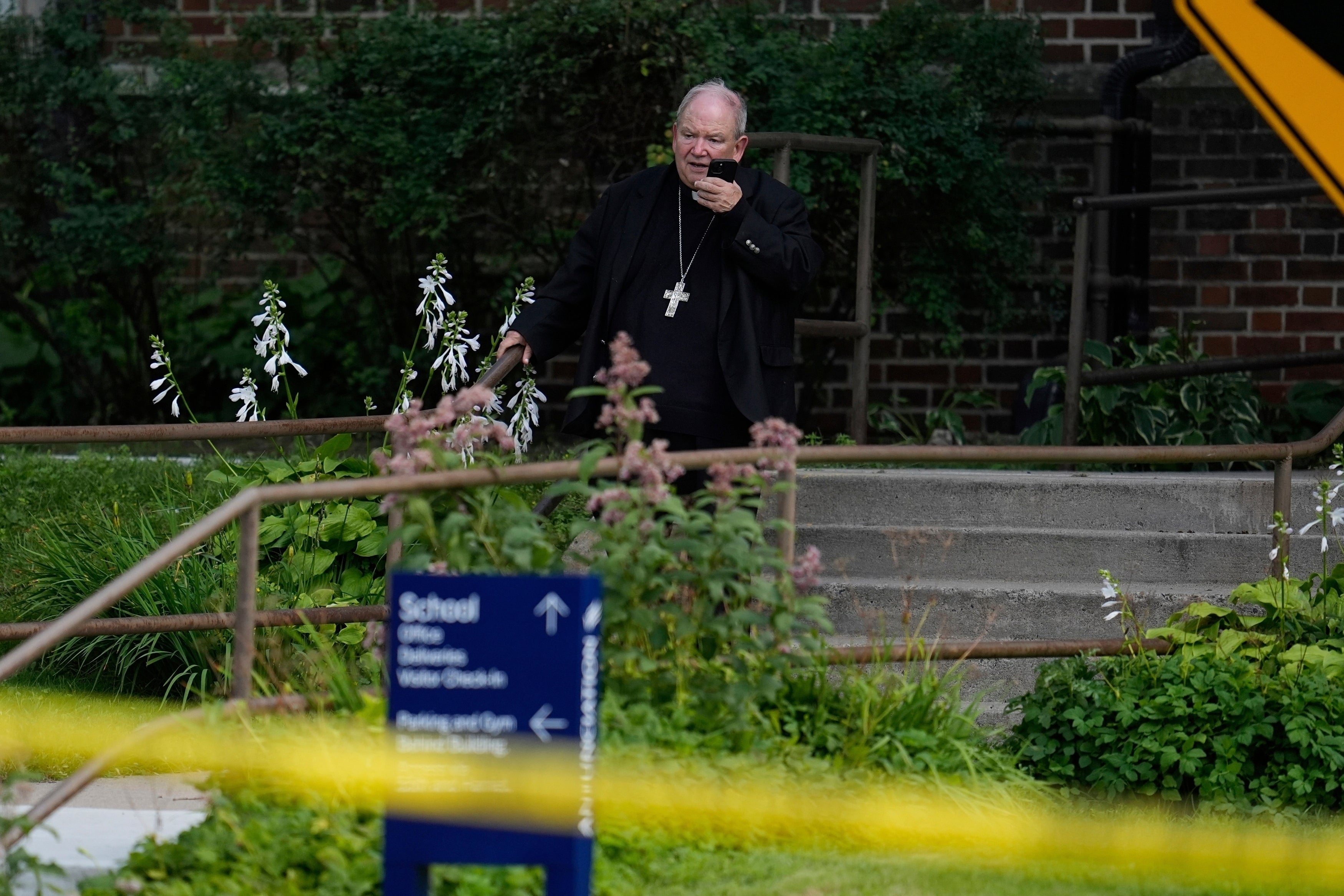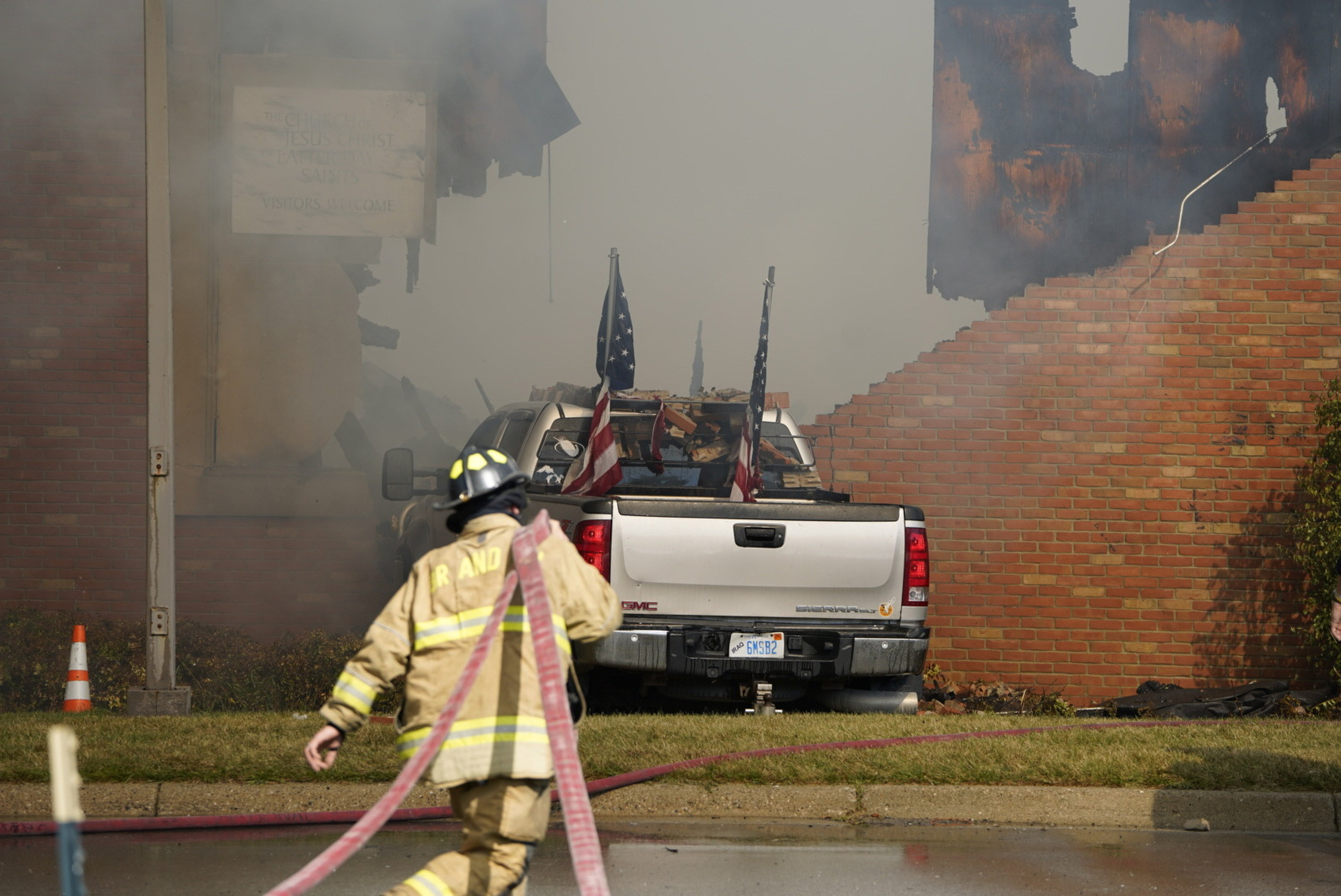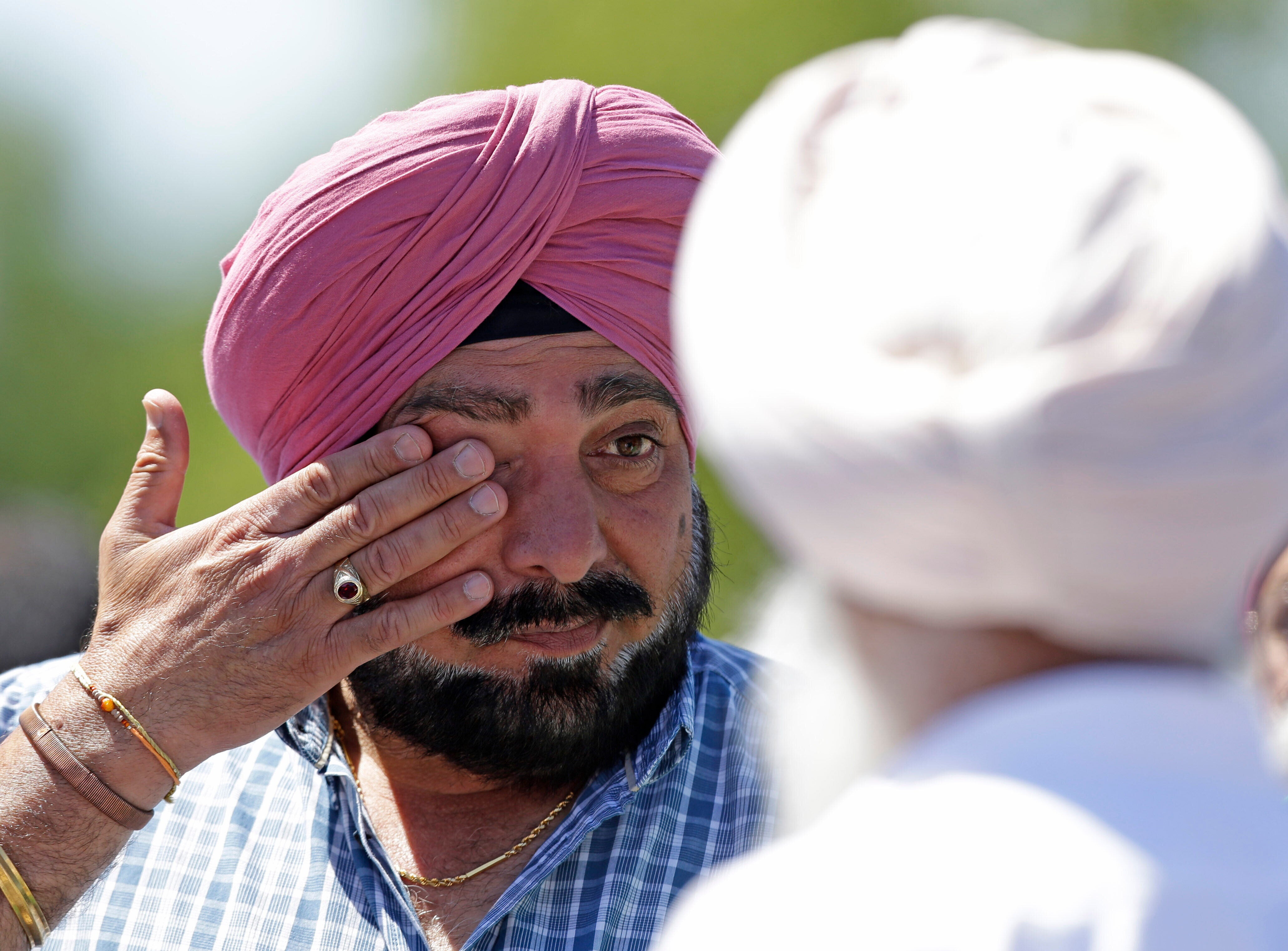
Every week, hundreds of millions worldwide gather for peaceful worship, yet this fundamental right to sanctuary is increasingly being shattered by deadly violence. Recent incidents, including an attack on a synagogue in England and two churches in the United States, echo a disturbing pattern seen previously at mosques in New Zealand, a synagogue in Pennsylvania, and a Sikh temple in Wisconsin.
Such acts inevitably fuel heightened anxiety and fear among religious leaders and their congregations worldwide. Despite bolstered security measures and increased vigilance among worshippers, a profound question persists: can faith communities truly find peace and safety when gathering to worship?
The Oct. 2 attack on a synagogue in Manchester, England, left two congregants dead and, according to police, was carried out by a man who had pledged allegiance to the Islamic State group. Two days later, a mosque in an English coastal town was targeted with a suspected arson attack.
Following those two attacks, “there is real fear,” said a Church of England bishop, the Right Rev. Toby Howarth. “People must feel safe in going to places of worship.”
How to instill that feeling is a constant challenge. In Germany, in response to several attacks, many synagogues have been surrounded by barriers and guarded by heavily armed police. In the United States, most synagogues — and many non-Jewish houses of worship — employ layered security strategies. These can involve guards, cameras, and various systems for controlling access to events through ticketing, registration or other forms of vetting.

The deadliest attack on Jews in the United States occurred in October 2018, when a gunman killed 11 worshippers from three congregations at Pittsburgh’s Tree of Life synagogue.
Eric Kroll, deputy director of community security at the Jewish Federation of Greater Pittsburgh, said synagogues there had begun systemic security trainings before the attack.
Some of the training recommendations — such as keeping a phone on hand for emergencies even on the Sabbath, when observant Jews normally wouldn’t use a phone — helped save lives during that attack, he said. The federation continues to evaluate attacks such as the one in Manchester to prepare for assailants’ evolving tactics.
“The wounds still run deep here in Pittsburgh for a lot of people,” said Kroll, adding that preparations help them to worship together confidently.
“It’s so easy to talk about all these things and be frightened," he said. "But if you teach ways to respond to those things, it empowers people to go and live their lives.”
A similar tone was sounded by Bishop Bonnie Perry, leader of the Episcopal Diocese of Michigan, in a letter to her congregations two days after a gunman killed four people inside The Church of Jesus Christ of Latter-day Saints in Michigan's Grand Blanc Township on Sept. 29.
“Many of us feel grief, fear, and deep unease,” Perry wrote. “It is natural to wonder whether the places where we pray and gather are safe.”
She proceeded to detail a balanced approach to security, rejecting suggestions to lock church doors during worship but encouraging greater vigilance and preparedness, including formation of emergency response teams at the diocese's churches.
“We do not want our churches to feel like fortresses; they are houses of prayer for every person,” she wrote. “At the same time, love of neighbor includes readiness to act swiftly should danger appear. … Our goal is not to shut people out but to keep everyone safe while maintaining the radical hospitality of the Gospel.”

While some Christian pastors in the U.S. encourage congregants to bring firearms to church as an extra security measure, numerous denominations and individual houses of worship forbid this. After the Grand Blanc attack, The Church of Jesus Christ of Latter-day Saints affirmed that it prohibits carrying firearms and other lethal weapons inside its meetinghouses and temples, except for current law enforcement officers.
Black churches in the U.S. have withstood a long history of violent attacks, from decades of church burnings and bombings to the murder of nine Bible study participants in 2015 at Mother Emanuel AME in Charleston, South Carolina. The perpetrator of that attack, now on death row, posted selfies with a Confederate flag to flaunt his racist rationale for shooting Black churchgoers.
A member of Metropolitan AME in Washington, D.C., Khaleelah Harris, 29, said the threat of violence is often on her mind.
“It can be difficult to be a part of a worship service, and you look around and five police officers are in the service because somebody just walked in, and they look a little suspicious. It shifts the atmosphere,” said Harris, who is in the AME ordination process.
Her church won a lawsuit earlier this year against the Proud Boys, after the far-right group vandalized the church’s property in 2020. The congregation has increased security, at one point paying $20,000 per month.
It’s a struggle to balance being a welcoming congregation with tightened security protocols, Harris said. “How does welcoming all and not being quote-unquote judgmental prevent someone from using their discernment or engaging security measures?”
In various forms, attacks on houses of worship have occurred through history. At present, attacks on individual houses of worship in places like the United States and Western Europe tend to draw the international spotlight more than attacks that are part of broader ongoing conflicts — such as Christian churches burned by Islamic militants in parts of Africa or the destruction of many mosques in Gaza through Israeli strikes mounted in its war against Hamas.
Attacks on mosques — usually blamed on Islamic militants with rival ideologies — have taken place in other Middle Eastern countries.
Egypt reeled in 2017 from the killing of more than 300 people in a militant attack on a mosque in Sinai frequented by Sufis, followers of a mystic movement within Islam. On March 4, 2022, an Afghan suicide bomber struck inside a Shiite mosque in Pakistan’s northwestern city of Peshawar, killing at more than 60 worshippers. The Islamic State group claimed responsibility.
Between those attacks was a day of horror in Christchurch, New Zealand, when a white supremacist gunman killed 51 worshippers at two mosques during Friday prayers in 2019. It prompted new laws banning an array of semiautomatic firearms and high-capacity magazines. They also prompted global changes to social media protocols after the gunman livestreamed his attack on Facebook.
During a wave of antisemitic incidents in Australia, a synagogue in Melbourne was firebombed in December 2024. Australian authorities have accused Iran of directing that attack.
Australia is among several countries, including South Africa and Britain, that have engaged with the U.S.-based Secure Communities Network to share information regarding possible antisemitic threats, according to SCN's national director, Michael Masters. The network provides security advice and training to Jewish institutions across North America.
“We act more like Interpol than we'd like to,” Masters told The Associated Press. “So many of these bad actors and their ideologies cross borders. So all of us have recognized that we are stronger when we work together.”

In the United States, religious leaders are urging Congress to expand the Nonprofit Security Grant Program. It helps nonprofits and houses of worship pay for security system upgrades and emergency planning.
In Britain, after the recent Manchester attack, Prime Minister Keir Starmer said more police resources would be deployed at synagogues.
From both the Jewish and Muslim communities in Britain, there are calls for authorities and civic leaders to curtail antisemitic or anti-Muslim vitriol that might incite future attacks.
Dave Rich of the Community Security Trust, a charity providing security to the Jewish community, told the BBC, “There is an inability to recognize antisemitism or a reluctance to deal with incitement in ways that have just allowed it to grow.”
“I think a lot of Jewish people will be saying OK, the sympathy is great, but where’s the action?” Rich added.
Wajid Akhter, secretary-general of the Muslim Council of Britain, said expanded police deployment is only a partial answer.
“There must be a reckoning with the hate being stoked in our public discourse,” he said. “The safety of British Muslims, and of all faith communities, depends on it.”
A grim list: Some notable attacks on houses of worship around the world in recent years
Statistically, attending a weekly worship service is a remarkably safe thing to do. Global annual attendance totals many billions; the number of people killed in attacks on individual houses of worship in any given year is generally less than a few hundred.
Yet high-profile deadly attacks in recent years — with targets including synagogues in England and Pennsylvania, two mosques in Christchurch, New Zealand, and a Catholic church in the United States hosting a Mass for school children — have intensified anxiety and outright fear among clergy and worshippers worldwide.
Here is a list of some of the notable attacks that have occurred on houses of worship in the past 15 years.
Australia
Dec. 6, 2024: As part of a wave of antisemitic attacks, a synagogue in Melbourne was firebombed. The building was heavily damaged and a congregation member was injured. Australian authorities have accused Iran of directing that attack.
Congo
July 27, 2025: Several dozen people were killed in Congo’s Ituri province when rebels stormed a Catholic church during a vigil and opened fire on worshippers.
Egypt
Egypt reeled in November 2017 from the killing of more than 300 people in a startlingly grisly militant attack on a mosque in northern Sinai frequented by Sufis, followers of a mystic movement within Islam. At that point, Egypt’s military and security forces had already been waging a campaign against militants in northern Sinai.
April 9, 2017: Suicide bombers struck hours apart at two Coptic churches in northern Egypt, killing more than 40 people and turning Palm Sunday services into scenes of horror and outrage. The Islamic State group claimed responsibility and vowed to continue attacks against Christians.
Britain
Oct. 2, 2025: An attack on a synagogue in Manchester, England, by a knife-wielding assailant left two congregation members dead. According to police, it was carried out by a man who had pledged allegiance to the Islamic State group.
June 19, 2017: A man drove a van at pedestrians near a mosque in London as worshippers were leaving after prayers. One man died; a dozen others were injured. The attacker was sentenced to at least 43 years in prison. A judge said he had been radicalized by far-right and Islamaphobic propaganda online.
France
Oct, 29, 2020: Three people were killed in a stabbing attack at a Catholic basilica in the French Riviera city of Nice. A Tunisian man charged with the attack was later sentenced to life imprisonment without parole, France’s most severe sentence possible.
July 26, 2016: Two assailants slit the throat of an 85-year-old priest after staging an attack on a Mass at a Catholic church in Normandy. The attackers were killed by police as they left the church; the Islamic State group claimed responsibility for the attack.
Germany
Oct. 9, 2019: A right-wing extremist tried to shoot his way into a synagogue in Halle on Yom Kippur while broadcasting the attack live on a popular gaming site. After failing to open the building’s heavy doors, he shot and killed a woman in the street and a man at a nearby kebab shop. He was convicted of murder and sentenced to life in prison.
March 9, 2023: A former member of the Jehovah’s Witnesses opened fire during a service at a Witnesses hall in Hamburg, killing six people and then himself. Nine other people were wounded, including a pregnant woman. Investigators said the gunman’s earlier exit from the Jehovah’s Witnesses was “apparently not on good terms.”
Oct. 18, 2023: Assailants threw two Molotov cocktails at a synagogue in Berlin. The firebombs burst on the sidewalk next to the building and two people who had approached the synagogue with them ran away with their faces covered. The attempted arson shortly after Hamas’ attack on Israel drew strong condemnation.
New Zealand
March 15, 2019: A white supremacist gunned down worshippers at two mosques in Christchurch during Friday prayers, killing 51. The attacks prompted new laws banning an array of semiautomatic weapons and high-capacity magazines. They also prompted global changes to social media protocols after the gunman livestreamed his attack on Facebook. The assailant was sentenced to life in prison without the possibility of parole, the first time the maximum available sentence had been imposed in New Zealand.
Norway
Aug. 10, 2019: A white nationalist Norwegian, Philip Manshaus, killed his Chinese-born stepsister and then drove to a mosque in an Oslo suburb where three men were preparing for Eid al-Adha celebrations. He fired rifle shots at the mosque’s glass door before being overpowered by one of the men.
Syria
June 22, 2025: A suicide bomber opened fire and then detonated an explosive vest inside a Greek Orthodox church near Damascus filled with people praying, killing more than 20 and wounding dozens, state media reported.
United States
Sept. 29, 2025: An ex-Marine smashed a pickup truck into a Church of Jesus Christ of Latter-day Saints church in Michigan, opened fire and set the building ablaze during a crowded Sunday service and then was fatally shot by police. Four people were killed and eight wounded.
Aug. 27, 2025: Two children were killed and several others were injured in a shooting during Mass at the Church of the Annunciation in Minneapolis. The shooter, who authorities say died of a self-inflicted gunshot, was a former student at the parish’s school.
Oct. 27, 2018: Eleven Jews attending services at the Tree of Life synagogue in Pittsburgh were fatally shot by a white supremacist with a history of antisemitism. The gunman, Robert Bowers, faces execution after his conviction on multiple federal charges.
Nov. 5, 2017: A family feud is believed to have prompted the deadliest mass shooting in modern Texas history. Twenty-five people, including a pregnant woman, were killed at First Baptist Church in Sutherland Springs.
June 17, 2015: A young man walked into a Bible study session at the historic Emanuel African Methodist Episcopal Church in Charleston, South Carolina, and killed nine people. The victims included the senior pastor, Clementa Pinckney. The shooter, was an avowed white supremacist; he is awaiting execution after his conviction on multiple federal charges.
Aug. 5, 2012: Six people at the Sikh Temple of Wisconsin in the town of Oak Creek were shot to death by a 41-year-old white supremacist who had discussed a racial holy war. One of the injured victims died in 2020 from his head wound, becoming the seventh fatality.
Ricky Hatton’s son pays emotional tribute as stars turn out for memorial service
Ricky Hatton funeral latest: Legend’s son pays tearful tribute as stars join mourners
Cooper defends prospect of digital ID for children as young as 13
26 migrants sent to France while nearly 10,000 have arrived since deal
Sir Geoff Palmer’s ‘extraordinary life’ hailed at memorial celebration
Hundreds of thousands of pro-Palestinian protesters expected on weekend march







